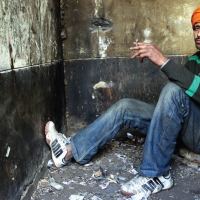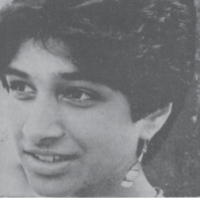
By- Rupen Ghosh, Facebook
Kamaladevi Chattopadhyay, born on this day in 1903 (April 3, 1903), should be remembered today for drawing attention to the revival and promotion of India’s rich and varied art and crafts, for championing of women’s rights, and as a social reformer, a fearless and committed freedom fighter and revolutionary. Committed to the causes of women empowerment, education, handicraft, theatre along with her contribution to the field of arts, crafts and writings, she was a remarkable person, who was endearingly referred to as a romantic rebel. Some credited her for initiating cultural renaissance in India. It is a pity that many in the present generation have not even heard of her name and her championing the role of women in the Indian freedom movement.
She came from a family background where her parents remained in touch with such prominent freedom fighters and intellectuals as M G Ranade, Gopal Krishna Gokhale, and women leaders like Ramabai Ranade, and Annie Besant, and this attracted young Kamaladevi towards the then resurgent nationalist movement. Later on, she participated in Gandhiji’s Salt Satyagraha of 1930 and was chosen as a front line unit of volunteers, after having prevailed over Mahatma not to restrict the movement to men alone. Defiant and daring, despite herself coming from a conservative background, she deified the orthodoxy and married Harindranath Chattopadhyay, when she was a widow, much to the opposition of the patriarchal society of those times, the early years of the last century, that were essentially conservative and conformist and against widow marriage. Harindranath was brother of Sarojini Naidu and an actor of some repute. Theatre bound them together and Kamladevi would act in and promote plays of social themes that carried the message of social reforms. The marriage however did not last long and they later on separated amicably.
As a committed women’s rights activist, she was instrumental in establishing the All-India Women’s Conference, with a clear agenda to work steadfastly for legislative reforms to bring women’s issues to the centre stage. During her tenure, she set up educational a number of institutions for women. Notable was the formation of Lady Irwin College for Home Sciences in New Delhi, a unique institution in those days.
During the ‘30s, she joined a group of idealistic and intellectually gifted and committed young men and women in forming the Congress Socialist Party. She subsequently became president of the party, working alongside Jayaprakash Narayan, Ram Manohar Lohia and Minoo Masani. She remained a life-long committed feminist, and for her, socialism and feminism were inextricably linked. She fought for women’s rights, including launching struggle for better working conditions for women in working places – factories and farms – and was one of the first to fight for their right to paid maternity leave.
An indefatigable freedom fighter and an idealist, she plunged wholeheartedly in the Quit India movement of 1942, and was incarcerated in jail for over a year. However, as India gained independence in 1947, she eschewed active party politics and stayed away from any accepting any formal posts, be in in the cabinet or as a governor, though there were offers in that direction, and chose to devote her life in social work. During the ‘50s and beyond, Kamaladevi concentrated towards the revival of art and crafts of India, by setting up the All India Handicrafts Board and being associated with it for two decades or so. Her interests in weaving, pottery, sculpture, toy-making, etc. led to forming cooperatives to market the produce of these wonderful craftsmen and craftswomen, so that they are not deprived of their rightful earnings. It is not any exaggeration that if today, India’s crafts and indigenous traditions survive and have a presence in the country as well as abroad, a large part of the credit should legitimately belong to Kamladevi Chattopadhay. Indeed, she was truly a remarkable personality, a selfless freedom fighter, committed to such varied interests as social reform, gender empowerment, community leadership, untiring work for promotion of handicrafts and indigenous culture. and devoted her life to these causes.











Apr 04, 2013 @ 06:18:40
Reblogged this on iheariseeilearn.
May 04, 2013 @ 13:36:53
Kamaladevi was an amazing grandmother,we called her “Amma.” During school holidays we (mother brother and I) traveled with Amma and her entourage to far flung villages all over India to encourage weavers, potters,carvers and a host of other folk crafts.
In my last conversation with her, a year before she passed away she confided in me with tears in her eyes that she always wanted to be “just a weaver” and had hoped I would have the same passion….
Jun 18, 2013 @ 00:43:26
Dear Nina
I am a feminist historian and have become fascinated with your grandmother. Where do you live? (I’m in LA). I would love to make contact. Can send you what I am writing. Ellen DuBois, Professor, UCLA History Department
Apr 18, 2015 @ 14:44:50
Dear Nina,
I am doing a research work on Kamaladevi Chattopadhaya. I am extremely delighted to know you as her granddaughter. I needed your help in regarding the same. Could you please provide me with some of her images, if you have. that would be of great help for me.
Sep 30, 2014 @ 09:54:01
Dear Nina,
I live in Chennai and am putting together a book with team of alumnae of Queen Mary’s College started in 1914. Your grandma was a student here for her intermediate (pre-degree) two years in those days. What a lovely person and how dynamic! An honour to read about her.Any photos of her early college days welcome.
Nithya Balaji. I am on face book.